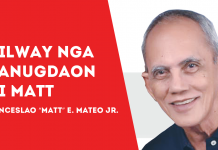
TO CUT a long story short, several online and mobile means are now available for the government and the people to virtually meet either jointly or severally, the latter should be interpreted to mean one side meeting on their own.
Believe it or not, there are existing mechanisms where the government and the people could meet in person, and these mechanisms are even backed up by the law.
Among others, the Regional Development Councils (RDCs) are supposed to be meeting regularly, as provided for in the Local Government Code (LGC). As it is supposed to be, all the regional directors are supposed to be attending the RDC meetings, but they are apparently not coordinating and communicating with each other about what they should discuss in those meetings.
As a remedy to that shortcoming, I propose the creation of the Alliance of Coordinating Councils for Organized Regional Development (ACCORD). As implied in the name, all regional directors should create their own coordinating councils for their own areas of concern, before they move up to the ACCORD level.
ACCORD should be good enough for the coordination of the government at the regional level, but aside from that, we also need coordination among the people at the regional level. Towards that end, I propose the creation of the Federation of Citizens and Leaders (FOCAL).
This could be used as the forum for bringing together the agendas of all NGOs and Civil Society Organizations (CSOs) at the regional level. As provided for in the LGC however, the RDC is supposed to be the apex of lower development councils at the barangay and municipal levels.
It goes without saying therefore that both ACCORD and FOCAL should also have people at the local levels. As it is supposed to be, all the actions of the RDCs should be coordinated by the National Economic Development Authority (NEDA).
For whatever it is worth, it could be said that both ACCORD and FOCAL could conduct their meetings via online and mobile means. First of all however, they should know each other and more important than that, they should be able to contact each other.
In this connection, CCS, a global company based in Singapore but with offices in the Philippines has offered the free use of PHILGOV, an online and mobile directory of Philippine government officials all the way down to the regional level.
Aside from that, CCS has also offered the free use of WECARD, an electronic substitute for paper calling cards. The technology uses the Quick Response (QR) could that is already a standard feature in all smartphones. By putting PHILGOV and WECARD together, these is no more excuse that government officials could not know each other and contact each other./PN



